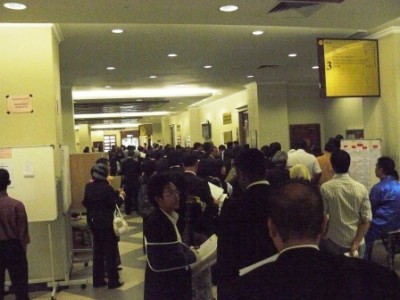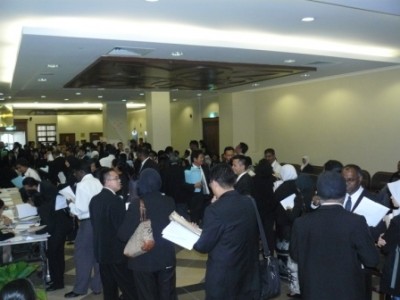With the impending year-end holidays on the horizon most lawyers are trying to finish up their work for the year. However, a significant number of lawyers would have no such opportunity in the Lower Courts for the last month. The introduction of the famed Tracking system in the Subordinate Courts (i.e the Session and the Magistrates Court’s), has now created a temporary refugee camp at the newly created managing judge zones. At least refugees would be queuing for a new life. Our lawyers are queuing up for another date to come back and queue again.

For those lawyers and members of the public who don’t understand this tracking system, let me attempt to explain our predicament. My following opinion has no relevance to the criminal subordinate courts who have been spared this latest attempt at achieving statistical efficiency.
There are many Civil Magistrate Courts and Session Courts that if you added them altogether you would have about 20 or so courts. Each court has its Judge (for Sessions Court) and Magistrate (for Magistrates Courts). Each of them would have about 10,000 to 50,000 files to go through every year. Most of these are small or standard claims which can be disposed off fairly quickly. Before the pre-tracking days, the Judge or Magistrate who would manage the Court and fix cases for hearings/trials. Admittedly, some courts are slower than the others; but eventually, matters move. I would have thought that it would have been better to tweak that system, instead of replacing the entire system wholesale and in one go with the tracking system.
What then is this tracking system?
With this system, all files from all the Subordinate Courts are managed by a central unit. That unit is known as the the ‘Managing Judge Unit’ (MJU). The Magistrate and Session Courts have their respective MJU. So instead of lawyers being in different courts at the same time, we have now 200 to 500 lawyers, mostly younger lawyers, hanging around the MJU areas at the same time. The Session Court’s MJU moved from the Basement to Level 3, whilst the Magistrate MJU remains in the Basement floor.
What happens there is unfortunate and depressing, sort of like a refugee camp. Lawyers have to queue for hours to find out about their files, like a refugee. What took about 20-30 minutes under the old system, now takes an epic (average) hour or two to sort out, which would be something simple like taking another mention date. We shouldn’t be spending more than 5 minutes to take a mention date.

So while the courts may boast of their sublime efficiency, this tracking system has resulted in a massive waste of lawyer’s time. Every minute away from the office for these lawyers would mean the lost of opportunity to serve other clients. Clearly this would adversely affect the incomes of legal firms, particularly the small firms who do not have legions of lawyers at their disposal.
How the current judicial administration can claim to be more efficient and yet waste lawyers time like our government wastes money is unsurprising and just gives an indication how much the court values lawyers time. It also indicates just how precious they think their time is in relation to the entire world. This is not a conducive, efficient or sensible method to dispense Justice. This initiative must be stopped and considered more fully with the input of the other stakeholders in the system like lawyers and the general public before being implemented.
The judicial policy makers should actually come down and feel those initiatives conceived in the perfection of their palaces of Justice. But they would have to wait and most importantly, get in line.

Dear Richard,
You forgot to mention that these refugees (especially the unlucky ones who are stuck in the basement level) are disconnected from the outside world too. No portable headsets (no matter how 'canggih' your phone may be) can get a connection down there. So beware!